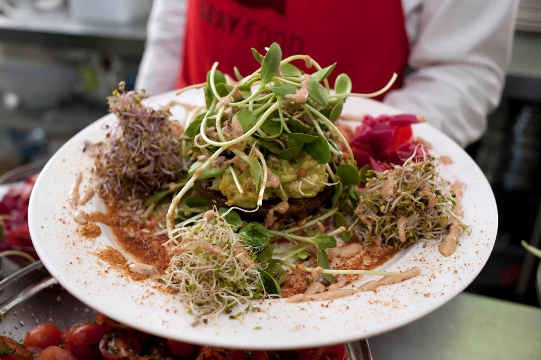Food cafés in some branches of the Wellness Warehouse have been up and running for some years. Recently, the Kloof Street, Cape Town, branch added some new counters. The other day, there was a Frenchman serving very palatable vegan buckwheat crêpes topped with avocado, baby tomatoes and mushrooms.
A new fixture is Sexy Food, probably best known for their buchu water on sale at certain supermarkets and convenience stores. Buchu is well known to the Khoi and San and is purported to have many miraculous properties, especially relating to the renal and digestive system. Buchu-infused vinegar was used to wash wounds and was apparently a lifesaver for troops in the Crimean War.
When I travel to dodgy and remote places, on the advice of an eccentric botanist, I take a tot of buchu brandy every night and a little with my toothpaste. Perhaps it is pure chance, but I suffer from more tummy bugs researching Once Bitten than when I am backpacking off the beaten track.
I’ve become hooked on Sexy Food buchu water and drink a glass a day, though I’m under no illusions; its health benefits are unproven. Sexy Food is the brainchild of James Kuiper. Still a young man, he is a lymphatic cancer survivor. He underwent conventional cancer treatment and it worked. But in remission he felt rundown. He started to experiment on himself to see whether diet made a difference. He stopped dairy, then bread, then caffeine, then sugar. Kuiper believes he enjoyed marked benefits.
Sexy burgers
Then he discovered chia seeds and other “superfoods” (things such as goji berries, maca, camucamu and lacuma powder). Kuiper is keen on chia seeds and his passion is for sprouts and microherbs. Unfortunately, there is no scientific evidence that sprouted foods are better for you or more nutritious than when they are consumed in unsprouted form. There are nutritional differences, but they are minuscule.
Sprouts are also risky if obtained from a supplier that isn’t particular. They have been responsible for some serious bacterial outbreaks of salmonella and E coli that resulted in legislators tightening up production rules in the United States, Canada and the European Union.
Most of us associate sprouts with salads and some Asian dishes, but Kuiper has taken it to a new dimension with his Sexy burgers – vegan patties made mostly from sprouted seeds he first started selling at the Noordhoek market. I’ve seen the Sexy Food lads at the Oranjezicht City Farm selling complete kits – soil trays and flasks filled with sprouts.
I can highly recommend the sprout falafel, above the bunless burgers, but they are almost identical in ingredients. These include coconut flour, coconut oil, carrot, sweet potato, butternut, lentil sprouts, mung bean sprouts, chickpea sprouts, sunflower seed, flax seed, Himalayan crystal salt, parsley, coriander, ginger, oregano, cumin, basil, pepper and cinnamon. It is served with tomato salsa, green chilli, a macadamia dressing and avocado. You can get it as a nicely packaged takeaway, too.
The “flexitarian”
Sexy Food states all its meals are free of gluten, dairy, soya, sugar and preservatives. Kuiper regards himself a “flexitarian”, meaning he is not dogmatic in his approach. I love his falafel and his buchu water, but we part ways when it comes to talk of detox or alkalising and body alkalinity, terms that are devoid of meaning. You’ll often overhear people in the “alternative food” set talk about cancer cures and antioxidants hoovering up free radicals and giving you longevity and curing cancer.
To cut a long story short, the only thing food and drink can change is the alkalinity of your urine, which you pass out the body. Your pancreas and body works hard to maintain the pH of your blood. To change the alkalinity of the blood or fluids in your cells would kill your healthy cells as fast as it would kill cancer cells, and you would know about it; you’d be very ill very quickly. But one thing I do not dispute – Kruiper’s Sexy Food is tasty and healthy.
Sexy Food, Wellness Warehouse, Lifestyle Centre, Kloof Street, Cape Town.
This article first appeared in the Mail & Guardian, 28 November 2014.

